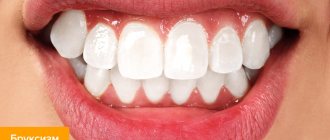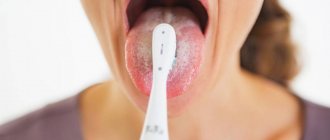How can you tell if your breath smells?
Determining the freshness of your own breath is not at all easy. We adapt to the aromas that we smell all the time and stop noticing them. In addition, the oral cavity and nasopharynx are a single system, and this makes testing difficult. But there are several simple and visual ways to understand if there is a bad smell.
- Lick your wrist with the tip of your tongue and wait 15-20 seconds until the saliva dries. The scent left on the skin will give you some idea of the freshness of your breath. However, the tip of the tongue collects the smallest amount of bacteria, so the results will not be completely true.
- The main breeding ground for microflora that causes an unpleasant odor is located at the root of the tongue. Run your finger or a cotton swab in the area and smell: if the “sample” smells strong, there is a high chance that your breath may be spoiled too.
- Take a plastic cup, place it on your lips and release the air through your mouth. The smell inside the container will help determine if you are suffering from halitosis.
- Ask a loved one if he notices a specific “smell” when he communicates with you. Sometimes this is the most reliable way to find out the answer to a sensitive question.
Information about the author of the method
Dr. Louis Malcmacher runs a private clinic in Cleveland, Ohio. He is also a researcher and consultant for Dentique Inc., a dental products and business consulting firm. Dr. Malcmacher is a frequent contributor to dental journals and has published numerous papers on adhesive resins in dentistry, bridges and crowns, dental practice management, periodontics, cosmetic dentistry and, most recently, the treatment of halitosis. He is also one of the authors of a popular monthly newsletter on new methods and materials, overhead reduction and practical management. Dr. Malcmacher is a panelist for the Association for Clinical Research, a visiting lecturer at the New York University School of Dentistry, editor of Dentistry Today, a speaker for the Academy of General Dentistry, a consultant to the American Dental Association's Council on the Practice of Dentistry, and has been named one of the Leaders in Advancement. Qualified by Dentistry Today magazine.
Dr. Malcmacher is an internationally recognized author and lecturer known for his thorough and entertaining style. He works closely with dental product manufacturers as a consultant and clinical researcher in the development of new products and techniques. For nearly two decades, Dr. Malcmacher has inspired his audience to truly enjoy being a dentist, providing the essential knowledge for excellent clinical and practice management. His group's dental practice has grown 45% since 1988.
Louis Jay Malcmacher DDS, FAGD www.medicus.ru
medicinform.net
Causes of bad breath
A slight bad breath in the morning is a completely normal phenomenon that almost everyone experiences. This happens due to a decrease in saliva production, mild dehydration and the accumulation of desquamated epithelium in the mouth. After a morning glass of water and brushing my teeth, everything returns to normal. But if the symptoms do not disappear throughout the day, we are talking about a disease - halitosis.
There are two main categories of causes of halitosis: oral (associated with diseases of the teeth, gums, tonsils, nasopharynx) and systemic - due to disturbances in the functioning of internal organs. In the vast majority of cases, we are dealing with the first reason.
Oral form
The specific putrid odor from the mouth is a product of the activity of anaerobic bacteria. They accumulate where there is no air: under dental plaque, under the gums, in carious cavities, on the tongue. By breaking down amino acids, bacteria release substances with a specific aroma (for example, hydrogen sulfide).
- Caries (including under dentures), gingivitis, pulpitis, periodontitis, stomatitis, dental cysts, pericoronitis. A rotten smell may indicate the beginning of necrotic processes.
- Diseases of the ENT organs: inflammation of the tonsils, adenoids, sinuses, nasal mucosa, especially if there is purulent discharge. Excessive mucus production leads to foul odor.
- Excessive dry mouth (xerostomia). Due to decreased salivation, the mouth is less cleaned and, accordingly, the likelihood of dental odor increases.
Bad smell as a symptom
Bad breath may also have other causes. The state of our breathing is affected by the functioning of the liver, kidneys, lungs, gastrointestinal tract, endocrine system, taking certain medications, smoking and addiction to alcohol. Only a doctor can determine the cause of halitosis, but the smell itself will help you get some idea of the disorder.
- The smell of acetone or rotting apples indicates the growth of ketone bodies in the blood plasma. In children, it can be a syndrome of type I diabetes, infectious diseases or dietary disorders. In adults, talk about the development of type II diabetes or poor nutrition due to alcohol dependence. When acetone appears in your breath, you first need to take a blood test to check the sugar content.
- The smell of urine (ammonia) raises suspicions about the development of kidney failure.
- The smell of fish is a syndrome of trimethylaminuria, a genetic disease in which the substance trimethylamine accumulates in the body.
- The smell of rotten eggs indicates another genetic disorder - cystinosis.
- A sweet smell may indicate decreased liver function and even cirrhosis.
- Sour smell - about bronchial asthma.
- The smell of iron is a likely symptom of diseases of the blood, pancreas or stomach. But it can also be caused by wearing metal prostheses or drinking water with a high iron content, so there is no need to worry ahead of time.
- The smell of vomit or excrement sometimes accompanies intestinal obstruction.
Express methods
There are many answers to the question of how to urgently remove bad breath. Here are the most effective express ways to get rid of bad breath.
- Chewing lemon, lime. This method will not eliminate the stench forever, but it will get rid of it for a few hours. You need to chew a piece of lemon or lime along with the peel. It is also recommended to use citrus zest as an emergency medicine, which you can always carry with you in a fabric bag.
- Coffee. Among coffee lovers, it is rare to find people with bad breath. Caffeine is known to kill unpleasant odors. If you can’t drink a cup of aromatic drink, it is recommended to gnaw 3-4 coffee beans (which you need to put in your pocket or purse in advance). This method will relieve the stench for 7-8 hours. It is not suitable for people suffering from periodic or constant increases in blood pressure. Hypertensive patients are better off chewing a few sprigs of dill or parsley. This method will not only freshen your breath for 8 hours, but also cleanse the oral cavity of bacteria.
- A sprig of cloves helps with terrible odor in the mouth. All you need to do is chew it for a few seconds. Clove essential oil extracted from the plant will not only refresh the oral cavity, but also lift your spirits.
- Juniper will help hide fumes well. It is recommended to chew the berries for several minutes. This method is capable of defeating even the strongest amber after active celebrations with the consumption of large quantities of alcoholic beverages.
- Sour apples can also combat this problem. Fruits will get rid of plaque, bad breath and improve the functioning of the digestive system.
- To get rid of the problem, it is recommended to chew pine nuts or roasted seeds for a few minutes. This will provide fresh breath for 1-2 hours and even get rid of the smell of garlic and onions.
- If you consume half a teaspoon of propolis daily, this will help eliminate stench and accelerate the regeneration of the mucous membrane during the development of inflammatory processes.
- A salt solution will also help get rid of the problem. To do this, you need to rinse your mouth with salty liquid (or sodium chloride 0.9%) for 2-3 minutes. It kills odor and destroys bacteria.
- If you rinse your mouth with any vegetable oil in the morning, it will relieve bad breath for several hours.
It is also recommended to use wormwood for chewing. The plant eliminates bacteria, restores the functioning of the gastrointestinal tract and eliminates bad breath. Magnolia has the same properties. All you need to do is chew the plant for 1 minute.
How to say goodbye to bad breath?
The problem can be eliminated only after its cause is determined. If the problem is diseases of the teeth and gums, it is necessary to cure all inflammatory and necrotic processes, put fillings, and, if necessary, replace dentures. Sometimes patients experience an unpleasant odor after tooth extraction: such a symptom may indicate the onset of complications, so it is better to see a dentist as quickly as possible. Periodontitis and periodontal disease give off a particularly strong putrid odor. The doctor will remove the deposits with ultrasound and prescribe therapy.
Since tonsillitis, bronchitis, sinusitis and other ENT diseases are a common cause of unpleasant odor in children, a treatment strategy should be chosen with an otolaryngologist. Komarovsky also recommends correcting mouth breathing - the cause of dryness and halitosis.
Which doctor should I contact?
If an unpleasant odor appears, the first step should be a visit to the dentist. This doctor will be able to help in the vast majority of cases. If no problem is detected, it is the turn of a nutritionist and gastroenterologist. Most likely, in this case, you will have to take additional blood and urine tests. Depending on the results obtained, a specific specialist will treat the problem: for problems with the thyroid gland - an endocrinologist, for kidney diseases - a urologist, for pathologies of the respiratory system - an ENT specialist or a pulmonologist.
You can get rid of an unpleasant odor only by establishing an accurate diagnosis. Therefore, if the problem persists longer than 2-3 days, it’s time to start an examination!
Author: Elena Kopylova Dentist-therapist, endodontist. Work experience more than 8 years.
The information is for reference only. Before treatment, consultation with a doctor is necessary.
How to prevent bad breath?
To avoid an unpleasant problem, prevention is necessary.
- First of all, high-quality oral hygiene. It includes not only brushing your teeth with a brush and toothpaste twice a day, but also using antibacterial rinses, dental floss, and sometimes an irrigator. To clean your tongue from plaque, it is better to use a plastic scraper rather than a brush.
- Once every 5-7 months, you must visit the dentist to remove dental plaque and conduct an examination. Almost any disease of the teeth and gums can be detected at the initial stage, without waiting for inflammation, pain and unpleasant odor.
- Experts recommend drinking 1.5-2 liters of clean water per day. This will help avoid dehydration and dry mouth.
- A healthy diet will keep your breath fresh. In the morning, it is better to give preference to oatmeal, which promotes salivation. Do not overdo it with protein and fatty foods, dairy products, coffee and spices, but be sure to include apples, oranges and celery in the menu.
- Regularly undergo preventive examinations with doctors and get tested.
Folk remedies
Traditional medicine can also cure halitosis. Moreover, in her arsenal there are no fewer tools than a dentist can offer. Thus, rinsing the mouth with water and adding a few drops of propolis tincture gives good results. For the same purpose, you can use an infusion of dried apricots, mint or strawberries.
It is quite effective to consume anise seeds daily on an empty stomach. And if you couldn’t find them, you can easily replace the anise seeds with two apples. The main thing is to rinse your mouth with warm water first.
After each meal, it is useful to eat half a teaspoon of grated ginger. But this recipe is not suitable for those patients who suffer from gastrointestinal diseases. In this case, it is better to simply chew or eat a couple of basil leaves. If bad breath is caused by sinusitis, traditional medicine recommends moistening cotton balls with celandine infusion and inserting them into the nostrils for 10 minutes. It will also be useful to replace store-bought rinses with decoctions of chamomile, sage or calendula.









